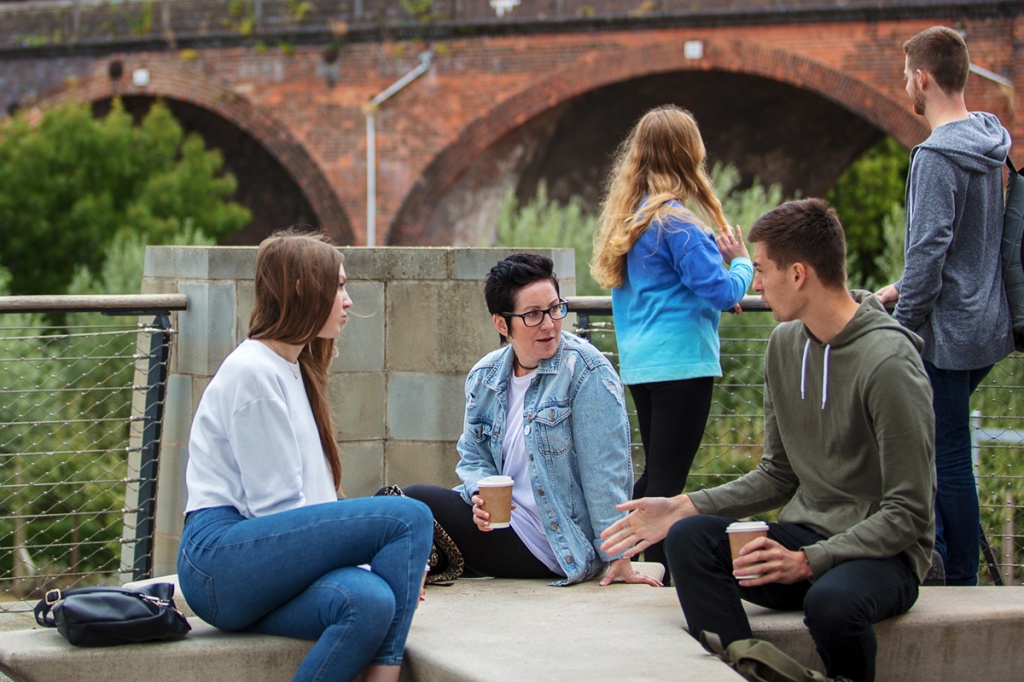Choosing to return to study can be a daunting prospect, and if like me you’ve been out of education for a long time, it’s hard to know if you’d even have the capacity to take on lectures and seminars, understand the academic language and keep up with your peers, let alone find the time to fit in studying and assignments. These were just some of my fears when I decided to bite the bullet and get a degree.
It has been 20 years since I had left school and entered the world of full-time work and spent that time, climbing up the ladder in the clinical retail industry and in later years, raising my three children. The prospect of entering into the unknown world of academia petrified me, but I was determined to give it a go, and I’m so glad I did!
You are not alone

One of my biggest anxieties before starting was that I’d be a complete fish out of water, feeling ancient compared to all the young students and so I wouldn’t fit in.
I couldn’t have been more wrong, in fact, nearly 65% of Worcester students are mature (aged over 21) and 40% of those are over 25, and it didn’t take me longer than a day on campus to realise that my fears were unfounded. The broad and diverse population of students at Worcester is just one of the reasons I love it here and I’m privileged to be a part of that community.
Making it work

Having a busy homelife means I have to be super organised to make sure I’m fitting in both uni work and family life. Planning ahead on a Sunday is my number one tip to getting through the week successfully (most of the time). I have reminders for myself and the kids on my phone and a family planner on the wall in the kitchen to make sure I know in advance who’s where and when every day, my family can see this information too, so there’s no confusion or conflict.
Another helpful tip is to communicate; Learning to be honest when I’m struggling or seeing the potential for overload has been key. Making use of my Personal Academic Tutor (PAT) has been invaluable, by offering guidance, reassurance and help prioritising workload when needed. There are so many other avenues for support too whether it be; Library Services (the Hive’s Academic Librarians are amazing), for help finding the right resources, a definite time-saver; IT support, when your laptop isn’t playing ball; or just a coffee and sit down with some friends are all ways I’ve found to make my life that little bit less stressful.
Make the most of your time

I’d be lying if I said I sit for hours reading relevant material, undoubtedly the more you can read the better but with a hectic life it’s just not possible. To get that extra knowledge, we have to be creative.
I carry a book and sticky notes in my bag with me, for moments on a weekend where I can sit and read for 5 minutes and note any relevant material while the kids are swimming or at a party, and listen to podcasts on my commute into campus or walking the dog.
Whilst I try and cram in as much studying as I can, it’s also important to take time for myself, impossible as it may sometimes seem. To clear my head and re-charge I make sure to go on a half an hour run or walk a couple of times a week which is a great way to clear the cobwebs and keep active when the day ahead might be sitting in lectures, but sometimes just a warm bath to relax or coffee with friends to unwind is equally as beneficial.
Setting time limits to any work you do at home is also important, I don’t want to upset the equilibrium of family life because of my studies, so I set aside ‘study time’ put a timer on it and then it’s pens down, and I can spend quality time with everyone guilt free!
Reminding yourself why

Whilst juggling studies and uni life with home and work commitments isn’t easy, it’s worth remembering why you’re here. There are many advantages of being a mature student, such as;
- Motivation– There are few students more dedicated and motivated than that of someone who has chosen to return to study. Remind yourself of the reasons why you’re here and look towards that end goal to keep you going.
- Life skills– Group work, independent work, organisation and time management, many students will be learning these skills ‘on the job’, but you have already gained these skills through working or raising a family.
- Experience– Much of what you learn through academic material will be made clearer with your experience, as you can put the theory into context from what you have already learned or experienced in life.
- Employability– Successfully managing your studies and other commitments as well as having the ambition to further yourself through education can be hugely attractive to prospective employer. Don’t be shy in showcasing what you have to offer!
I would encourage anyone who is considering returning to education to take the plunge. Spending time in this vibrant, diverse city with its beautiful historic buildings, vast array of coffee shops and restaurants and riverside walks all add to experience and although it can be a juggling act, it’s rewarding, interesting, liberating and I don’t regret it for a second!

